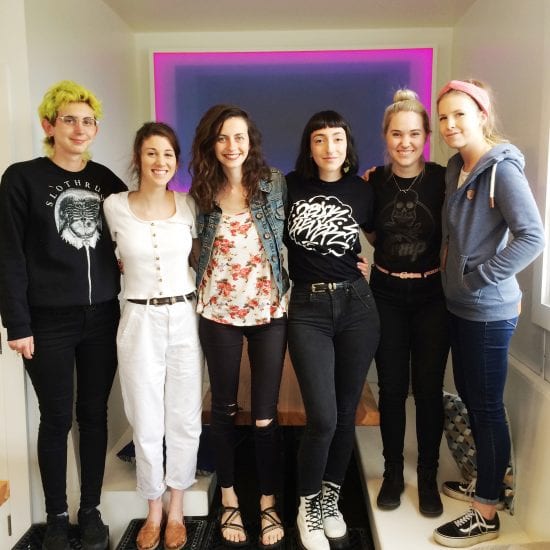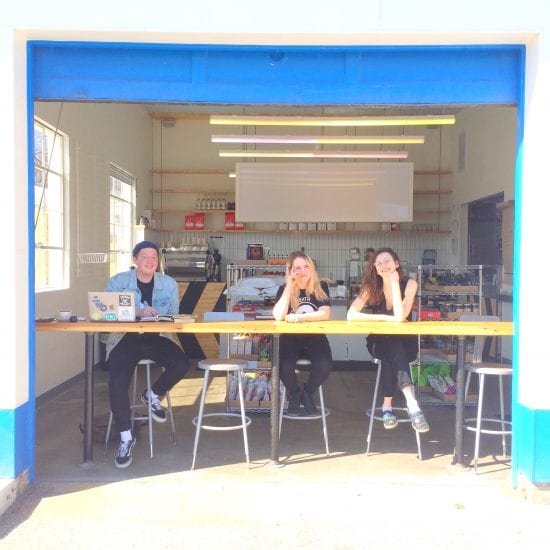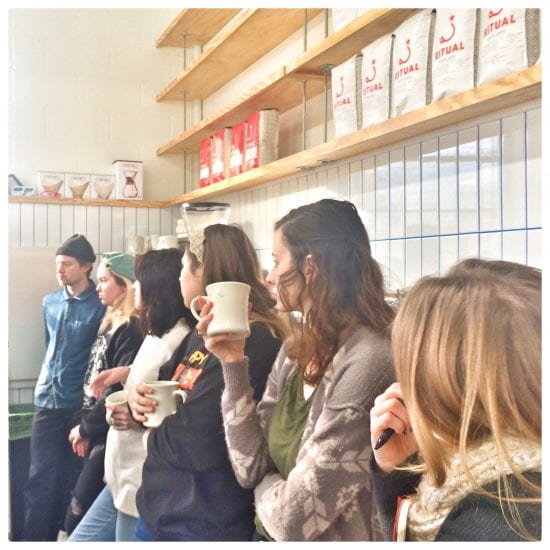
After feeling stuck at their barista jobs, a group of baristas worked together to build Full Stop, a co-op model cafe in Louisville, Ky.
BY ASHLEY RODRIGUEZ
BARISTA MAGAZINE ONLINE
Photos courtesy of Full Stop
We’re bringing back our co-op spotlight, a series first started by Barista Magazine contributor RJ Joseph. From the original: “In this series, we highlight cooperatively run coffee shops and explore the details of what makes co-ops tick. To learn more about the co-op model, read our feature in the the October + November 2018 issue of Barista Magazine.”
Let’s say there are eight baristas at a coffee shop. One day, the owner or boss says that one of you will be the manager, and your co-worker gets promoted. You’re happy for your co-worker, but what does that mean for you? With the only position in which you can move up in the company now occupied, what does your future look like? And what does that say about the commitment and hard work you’ve already put into the café?
The folks at Full Stop wanted to address these ideas. Built by a group of baristas in Louisville, Ky., many of them felt like they were reaching ceilings at their former jobs that they would never break through. They also wanted to eliminate the feelings of competition that can naturally come when many are vying for a few, higher-paying, positions. “We all saw that the co-op model, providing equal pay and equal say, would create an environment where everyone is lifting one another up and collaborating rather than competing for a position with better pay or to be the only person in charge,” says Sarah Hewett-Ball, one of the members of the co-op at Full Stop.

After feeling frustrated and finding a property owner who believed in their mission, Full Stop worked tirelessly to develop standards and guidelines about how they wanted to make their co-op work. They opened just five months ago and are poised to break even any day now.
MISSION
As stated above, one of the biggest hurdles that members of the 10-person co-op were running into was lack of advancement in their careers. Instead, Full Stop focused on creating dignified jobs for all its members, including equal pay for all.
“Our mission is to provide our neighborhood with unsurpassed quality in both product and service. Of equal importance is the well-being of each of our employees. Each member is invited to be a part of the team because we believe that they share our commitment to excellence and we know that their ideas, talent, and energy will be the foundation of everything we build,” says Sarah.
STRUCTURE
Part of the extensive planning that went into Full Stop was how responsibilities would be divided among members. At Full Stop, everyone is responsible for every corner of the space, and responsibilities rotate every two weeks. “Everyone is well-versed in each facet of the cafe and alternates working all positions,” Sarah says.

“We rotate who chooses the schedule first at our all-staff biweekly meetings, and whoever has first pick is the manager during that time,” says Sarah. “It’s amazing because if someone needs to step away, there are systems in place to ensure that nothing is missed. Plus, when everyone is a manager, everyone feels accountable and empowered to step up to any challenge.”
FINANCES
Full Stop aims to be completely transparent. Every two weeks, when folks sit down and rotate store responsibilities, they also talk about the successes and failures of the two-week period. “While we are striving to be as socially and environmentally sustainable as possible, we absolutely have to be financially sustainable to survive and support one another,” says Sarah.
The reason transparency is so important is because decisions are made as a group. “We also have to be completely transparent to make informed decisions and for that reason we are all a part of the accounting and dealing with QuickBooks, pricing, and cost evaluation,” Sarah adds. “The profit-and-loss statement is evaluated at each biweekly meeting.”
DECISION-MAKING
For the most part, members of the co-op are entrusted with making small decisions, but they bring bigger ones either to the group or to the manager for that period. “Day-to-day and short-term decisions can be made by anyone on shift, but by default are handled by the biweekly manager. Most decisions are submitted for discussion at the meetings and if it comes to it, we bring it to a vote at the subsequent meeting,” Sarah explains.

CHALLENGES
Because all major decisions come to a group vote, it can be difficult to accept that you’re not always going to get what you want. “Certainly the cons of working in a democratic cooperative are that not everyone gets what they want all the time; we have to stick to a vote and go with the majority,” Sarah says.
However, this means that to get something through, people really have to prove their point. Folks come to staff meetings with notes, articles, and research to show that their point or idea is the right course of action to follow. “This ends up being pretty wonderful though—when people are passionate about an issue or idea, they research and think things through to such an extent that when it is discussed among the group the best possible options always rise to the surface,” says Sarah.

